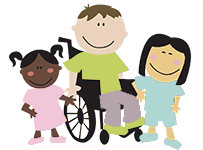Five Ways a Speech-Language Pathologist Can Help Your Child
[vc_row][vc_column][vc_column_text]Five Ways a Speech-Language Pathologist Can Help Your Child
 Speech-language pathologists carry out specialized speech therapy targeted at children who have problems with speech and communication. These specialists routinely deal with articulation delays and other speech issues, ranging from minor issues like stutters and lisps to more serious conditions caused by developmental delays, motor speech disorders, Down syndrome, hearing impairment, and more.
Speech-language pathologists carry out specialized speech therapy targeted at children who have problems with speech and communication. These specialists routinely deal with articulation delays and other speech issues, ranging from minor issues like stutters and lisps to more serious conditions caused by developmental delays, motor speech disorders, Down syndrome, hearing impairment, and more.
If you are parenting a child with any of these problems, here are five ways a speech-language pathologist can help your child overcome speech difficulties and communicate more effectively.
Better Articulation and Intelligibility
Individual sounds or phonemes that constitute speech depend on the ability to precisely move the articulators—the palate, lips, jaw, and tongue. The ability to articulate correctly, in turn, affects the intelligibility of speech. Problems in articulation can prevent you from understanding what your child is saying.
A speech-language pathologist can help your child overcome existing difficulties with articulation while also demonstrating the correct way to articulate specific sounds needed for intelligible speech.
Overcoming Stuttering
Stuttering usually begins in childhood and can go on to become a significant hindrance to effective communication, culminating in a negative impact on the quality of life and self-esteem. Typically, stuttering manifests in the form of frequent breaks in the flow of speech, often accompanied by other physical behaviors or tics like clenched fists or tension in the neck.
Speech-language pathologists can work with your child to reduce these manifestations, thereby improving speech intelligibility and fluency.
Effective Listening
Children with developmental delays and speech issues often understand speech far better than they can articulate. The ability to express through communication can improve dramatically by developing practical listening skills and learning new vocabulary.
This training, provided by a speech-language pathologist, can help improve your child’s ability to communicate effectively.
Effective Expression
Communication via speech is an expressive process, often accompanied by gestures, body language cues, and relevant facial expressions. Effective communication also depends on learning the nuances and subtleties, grammar, syntax, and colloquialisms of the language.
With the help of a speech-language pathologist, your child can inculcate these abilities, learn the semantic structure and the idiosyncrasies of the language, and find new, innovative ways to express themselves effectively.
Easier Feeding
Feeding issues often accompany problems with speech. Problems with feeding and swallowing can stem from an inability to effectively use the mouth’s anatomical parts or from myofunctional disorders.
With their intimate knowledge of the oral cavity, its component parts, and the mechanics that govern feeding and swallowing, speech-language pathologists can be of great help if your child has feeding issues.
If you are looking for expert help with your child’s speech issues, you can contact us at Speech and Occupational Therapy of North Texas, schedule a consultation, and help your child begin the necessary treatment.[/vc_column_text][/vc_column][/vc_row]
